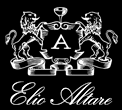The winery
Grandpa Giuseppe came from Dogliani to la Morra in 1948.
The Altare family was originally from the town of Dogliani before buying the farm in La Morra. Back then, the estate covered 5 hectares of nebbiolo, barbera and dolcetto vineyards, along with some peach, hazelnut and apple trees. Those were times when orchards gave higher yields and more profits than vineyards.
Back then it wasn’t easy, given the economic crisis that lasted for years. Elio, along with other friends, decided to learn more about winemaking by traveling beyond the borders of Piemonte, trying to learn from the success that other regions were enjoying. Their first trip to Burgundy, in January 1976, was a revelation, and when Elio got back home he knew there were major changes to be made.
He wasn't afraid: he grabbed a chainsaw as if it was a sword, and first he cut down the fruit trees in the orchard, then he chopped up the big old wooden tanks in the cellar into firewood. In this way, he made room for his first brand-new barrique.
His father Giovanni didn't understand him. His son's radical decisions were too far from his way of thinking. Being from an older generation and poorer times, he was not able to accept what he thought was an offense against common sense and tradition, and because of their different opinions, Giovanni and Elio’s relationship fell into silence. He died in 1985 and tragically disinherited Elio.
Elio continued to work while he bought back the winery and vineyards from his siblings.
Elio stood firm then and still does today. His decisions marked a radical change of direction and give a different interpretation to the family's wine, favouring elegance, finesse, and balance, following a strict regime in the vineyards, and adopting new vinification and aging techniques in the cellar.
The farm is still family-managed today. In 2003, Silvia – Elio’s oldest daughter – began working beside him, while Elena, his younger daughter, moved to Germany, where she runs a wine importing company.
Up to today we farm about 10 hectares with an average production of 70,000 bottles.
